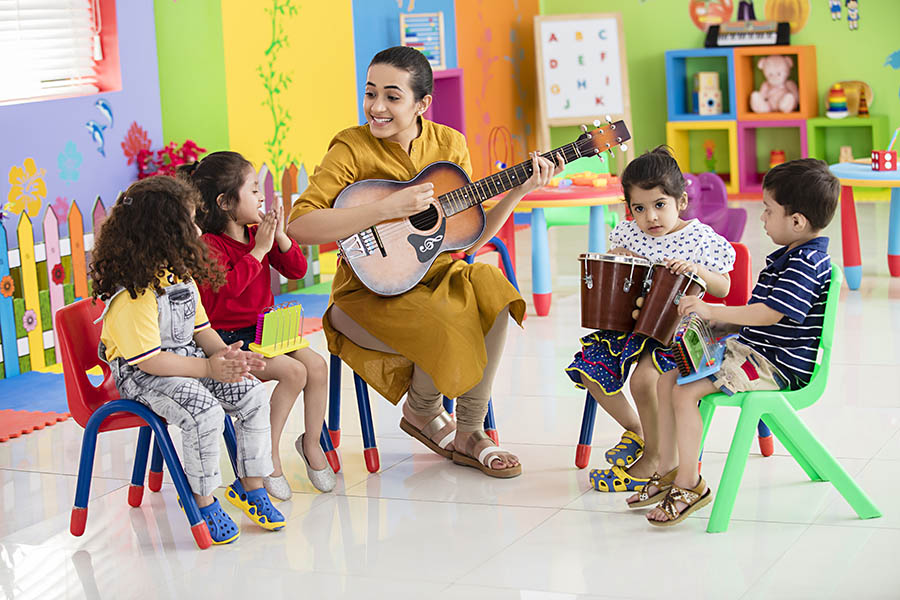HOW IT WORKS
Music Schools

- Institutions specializing in music education, offering instruction in various musical instruments, theory, and performance.
Music schools are educational institutions that specialize in providing music education and training to students of all ages and skill levels. These schools offer a wide range of music-related courses, including instrumental and vocal lessons, music theory, composition, music history, and performance opportunities.
Key characteristics of music schools include experienced and qualified instructors, state-of-the-art facilities and equipment, personalized instruction tailored to individual student needs, and a strong emphasis on fostering creativity, discipline, and passion for music.
The target audience of music schools typically includes aspiring musicians, music enthusiasts, children and adults looking to develop their musical talents, and individuals preparing for music college or professional careers in the music industry.
Common products and services offered by music schools may include private lessons, group classes, ensemble rehearsals, music workshops and masterclasses, recitals and concerts, music theory textbooks and materials, and music instrument rentals.
Typical business models for music schools involve a combination of tuition fees, concert ticket sales, donations, sponsorships, and grants. Some music schools may also offer online music courses and virtual music lessons to reach a wider audience and adapt to changing market trends.
Notable trends and innovations within the music school industry include the integration of technology in music education, such as virtual reality music lessons, online music production software, and interactive learning platforms. Additionally, many music schools are expanding their curriculum to include diverse music genres, world music traditions, and interdisciplinary arts programs.
The unique value proposition of music schools lies in their ability to provide high-quality music education, individualized instruction, performance opportunities, and a supportive community of fellow musicians and mentors. However, music schools may face challenges such as competition from online music courses, declining public funding for arts education, and the need to adapt to evolving student preferences and learning styles.
Overall, music schools play a vital role in nurturing musical talent, fostering creativity and self-expression, and preserving the cultural heritage of music in society. They serve as valuable institutions that inspire and empower individuals to pursue their passion for music and achieve their full potential as musicians.
Initial Stage: The music school begins by identifying market opportunities and consumer needs within the community. This involves conducting market research, assessing the demand for music education, and understanding the preferences of potential students and parents.
Product Formulation: Based on the identified needs, the music school formulates a range of music education programs and services tailored to meet the demands of students. This includes offering lessons in various instruments, music theory classes, ensemble opportunities, and performance workshops. The school emphasizes a personalized approach to teaching, focusing on individual student growth and development.
Marketing and Promotion: The music school adopts a multi-faceted marketing strategy to reach its target audience and generate interest. This may include online and offline advertising, social media campaigns, partnerships with local schools and community organizations, and hosting open houses or recitals to showcase the school’s offerings.
Sales and Distribution: The music school utilizes various channels to enroll students, including online registration, in-person consultations, and referrals from current students. Customer interactions are key in this stage, as the school seeks to build relationships with families and provide a seamless enrollment process.
Post-Sale Services: After students enroll in programs, the music school focuses on providing ongoing support and guidance to ensure their satisfaction and progress. This may involve regular communication with parents, progress reports for students, and opportunities for feedback and improvement.
Continuous Improvement: The music school regularly seeks feedback from students, parents, and staff to identify areas for improvement and adaptation. This may involve updating curriculum, introducing new programs or services, or implementing technology to enhance the learning experience. The school is committed to continuous growth and innovation to meet the evolving needs of its community.
In the realm of music schools, daily operations face a multitude of challenges across various domains. Resource management can be a struggle due to limited budgets and the need for quality instruments and equipment. Communication & collaboration issues arise from coordinating schedules with teachers, students, and parents. Process inefficiency may stem from outdated administrative systems or lack of streamlined procedures. Inventory management is crucial for music schools to keep track of instruments and supplies. Quality control is essential for maintaining high standards in music education. Technology integration can be a hurdle for music schools looking to incorporate digital tools into their teaching methods. Data management is important for tracking student progress and managing administrative tasks. Risk management is crucial for ensuring the safety of students and protecting the school from liabilities. By addressing these challenges with efficient strategies and solutions, music schools can navigate their daily operations successfully.
-
Webspad revolutionized our music school operations by providing a user-friendly platform for managing schedules, communicating with parents, and tracking student progress. Previously, we struggled with coordinating lessons, juggling multiple schedules, and keeping parents informed. Webspad’s tech tools streamlined our processes, improved communication, and enhanced our overall efficiency. Now, we can focus on delivering high-quality music education while Webspad handles the rest. Our daily operations have never been smoother, thanks to Webspad!
Music Schools Merchant Tweet / X

